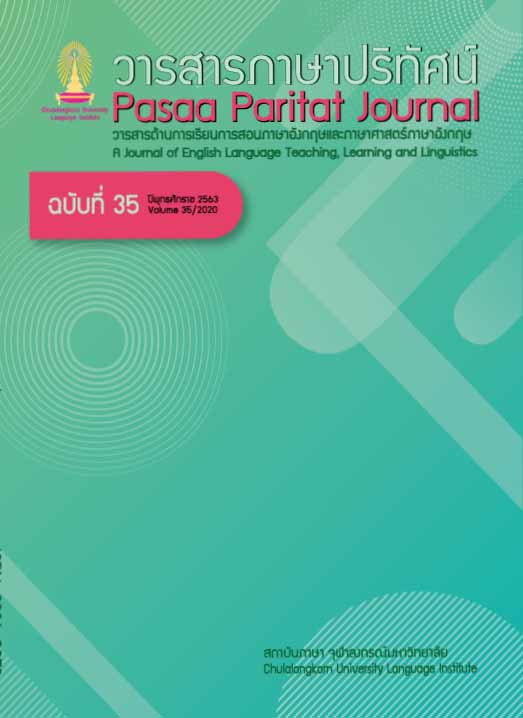Interactional Competence of Low-intermediate EFL Learners in a Cultural Exchange Conversation Task with Non-Thai English Speakers
คำสำคัญ:
interactional competence, conversation analysis, classroom assessment, low-intermediate EFL learnersบทคัดย่อ
Interactional competence has received much attention recently as it is considered imperative for effective spoken communication between interlocutors, and especially for English as a Foreign Language (EFL) learners. This study examined interactional features of low-intermediate Thai EFL learners which were employed as they engaged in a cultural exchange conversation task with foreigners. The prompts used in this classroom assessment task served as the instruments that yielded data in the form of audio recorded conversations, transcriptions and learner reflections of their conversations. Conversation analysis
and quantitative analysis of the conversational data revealed four ‘basic conversational actions’ underlying 12 interactional features displayed. Findings suggested the possibility of basic interactional competence (Kecskes et al., 2018) contributing to the actualization of some of the exchanges, as the EFL participants were able to utilize interactional features to interact with their foreign counterparts despite their language limitations. Thematic analysis of learners’ written reflections on their conversations provided insights into their perceptions in relation to the interactional features used in their conversations. Similar cultural
exchange conversations are recommended, as these types of tasks can elicit facets of interactional competence carried out in authentic contexts; however, they should be carried out as low-stakes assessment tasks. Engaging in a conversation with foreigners allows EFL learners to exercise their communicative agencies and interactional skills, given that proper scaffolding is carried out prior to the task. Including interactional features as constructs on a scoring rubric for such a conversation task may be possible with careful design and validation, and with reminders for learners to approach the task with the four underlying conversational actions in mind for a successful conversation
เอกสารอ้างอิง
Abu-Akel, A. (2002). The psychological and social dynamics of topic performance in family dinnertime conversation. Journal of Pragmatics, 34(12), 1787-1806.
Aoki, A. (2010). Rapport management in Thai and Japanese social talk during group discussions. Pragmatics, 20(3), 289-313.
Atkinson, J. M., & Heritage, J. (Eds.). (1984). Structures of social action.Cambridge: Cambridge University Press.
Bailey, K. M. (2003). Speaking. In D. Nunan (Ed.), Practical English language teaching (pp. 47-66). New York, NY: McGraw-Hill.
Brown, A. (2003). Interviewer variation and the co-construction of speaking proficiency. Language Testing, 20(1), 1–25.
Brown, P., & Levinson, S. C. (1987). Politeness: Some universals in language usage. Cambridge: Cambridge University Press.
Clancy, P. M., Thompson, S. A., Suzuki, R., & Tao, H. (1996). The conversational use of reactive tokens in English, Japanese, and Mandarin. Journal ofpragmatics, 26(3), 355-387.
Davison, C., 2007. Views from the chalkface: English language school-based assessment in Hong Kong. Language Assessment Quarterly 4(1), 37–68.
Dings, A. (2014). Interactional competence and the development of alignment activity. The Modern Language Journal, 98(3), 742-756.
Ducasse, A. M., & Brown, A. (2009). Assessing paired orals: Raters' orientation to interaction. Language testing, 26(3), 423-443.
Galaczi, E. D. (2013). Interactional competence across proficiency levels: How do learners manage interaction in paired speaking tests? Applied Linguistics, 35(5), 553-574.
Galaczi, E., & Taylor, L. (2018). Interactional competence: Conceptualisations, operationalisations, and outstanding questions. Language Assessment Quarterly, 15(3), 219-236.
ดาวน์โหลด
เผยแพร่แล้ว
เวอร์ชัน
- 2022-04-12 (3)
- 2022-04-12 (2)
- 2021-02-01 (1)
รูปแบบการอ้างอิง
ฉบับ
ประเภทบทความ
สัญญาอนุญาต

อนุญาตภายใต้เงื่อนไข Creative Commons Attribution-NonCommercial-NoDerivatives 4.0 International License.



